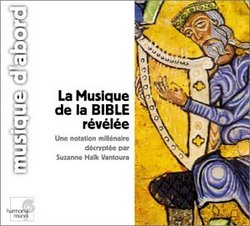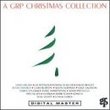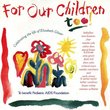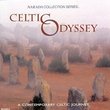| All Artists: Suzanne Haik-Vantoura, Adolphe Attia, Michel Scherb, Emile Kacmann, Martine Geliot Title: La Musique de la BIBLE revelee' Members Wishing: 1 Total Copies: 0 Label: Harmonia Mundi Fr. Release Date: 10/10/2000 Album Type: Import, Original recording reissued Genres: Special Interest, Classical Styles: Opera & Classical Vocal, Historical Periods, Early Music Number of Discs: 1 SwapaCD Credits: 1 UPC: 794881601523 |
Search - Suzanne Haik-Vantoura, Adolphe Attia, Michel Scherb :: La Musique de la BIBLE revelee'
 | Suzanne Haik-Vantoura, Adolphe Attia, Michel Scherb La Musique de la BIBLE revelee' Genres: Special Interest, Classical
|
Larger Image |
CD DetailsSimilarly Requested CDs
|
CD ReviewsMusically Compelling, But Is It Correct? Timothy Dougal | Madison, Wi United States | 08/07/2002 (4 out of 5 stars) ""The Music of the Bible Revealed" is a fascinating CD, which I bought primarily so I could hear Biblical Hebrew sung at my convenience. Little did I realize the arcane nature of this work. Regarding the notes accompanying the disc, and the other review posted here, though, I am somewhat dubious as the the correctness of the theory by which this music was produced. Vantoura's work was to decipher the markings around the words in the Masoretic text of the Hebrew Bible, I gather in conjunction with the text, as music, that is notatable in the modern style. This is pretty far out. Perhaps even farther out is the notion that these markings represent the actual music sung at the temple in Jerusalem prior to 70 CE. This theory, however, overlooks one very important fact. The oldest Hebrew Biblical texts we have, from Qumran, written while the temple was operating, and for a little while after, possess neither vowel markings nor what are now generally considered cantillation marks. These marks appear, along with the vowel marks, only in Medieval manuscripts. Early Medieval Christian music was signified in a similar manner, with markings above the Latin text, which are now poorly understood. A Benedictine music professor of mine suggested that these were memnonic devices as part of an essentially oral transmission process. To me it seems more likely than not, that the marking of the Masoretic text were part of a similar development, and not inherent in the original composition of the text. Transformation of the MT into music seems like a typically Kabbalistic enterprize.Whatever the truth is, however, this disc is very interesting. Many of the chants are unaccompanied, some utilize a spare harmonic choir and instrumentation. The music sounds as Medieval as Middle Eastern, and resembles the music of Machaut at times. The performance is solid, and well-recorded, but never quite inspired. Still, an intriguing CD" 5 stars for its importance, 4 for its performance John Wheeler | King David's Harp, Inc., Houston, TX. USA | 02/01/2001 (4 out of 5 stars) "The Psalms and songs of the Bible are of course well-known to all Bible students. What is not so commonly known is that all of Hebrew Scripture was originally meant to be sung -- and that to instrumental accompaniment. "Your statutes have been my *zemirot* (songs accompanied by harp or lyre) in the house of my pilgrimage" (Psalm 119:54). The vocal melodies are said to be contained in the "musical accents" (*te`amim*) of the Hebrew Masoretic Text.Suzanne Haik-Vantoura (d. September 22, 2000) sought to rediscover the original musical meaning of the *te`amim*, which have been given many different musical interpretations by the synagogue communities. Starting from the premise that the *te`amim* are primarily musical (not primarily exegetical as the Masoretes assumed), and using the Hebrew verbal syntax as her "Rosetta Stone" (technically, her "virtual bilingual"), she systematically derived a "deciphering key" capable (for the first time) of explaining all the features of the notation and its relationship to the words. Moreover, she discovered evidence that the *te`amim* (which transcribe a system of hand- and finger-gestures used to conduct music) actually preserve the melodies created by the biblical authors and transmitted along with their own words.This Harmonia Mundi France recording is the first of eight that have been produced to date. (The others, produced by Alienor, are available only from France or other locations outside the U.S.) It is the shortest, and in some ways the least well-produced, but has the greatest variety of texts for its size. (Modern instruments are used; the instrumental arrangements and choral harmonies are meant to evoke, not to reconstruct, the original settings.) The marvelous renditions of Pss. 23, 24 and 122, plus the Elegy of David, alone make the purchase worthwhile. While there are some transcription errors in some melodies, they do not seriously affect the simple, yet profound character of the arrangements.This recording (properly called *La musique de la Bible revelee*) originally appeared as an LP in 1976, along with the first edition of the French book of the same title. The LP won a *Diapson d'Or* (Gold Tuning Fork) and other awards in France; the book (2nd ed.), the Prix Bernier from the Institute of France. The English translation of the French book is likewise available ...For more information on Haik-Vantoura's work (and for answers to questions raised here by other reviewers!), please see my Web site ... Contact information is also available there." La Musique de la bible revelee E. W. Brascamp | Netherlands | 05/14/2007 (5 out of 5 stars) "It is very intriguing to listen music which is claimed to be reconstructed from writings in the margin of old biblical text. And the music is sounding authentic and modern at the same time."
|

 Track Listings (14) - Disc #1
Track Listings (14) - Disc #1








